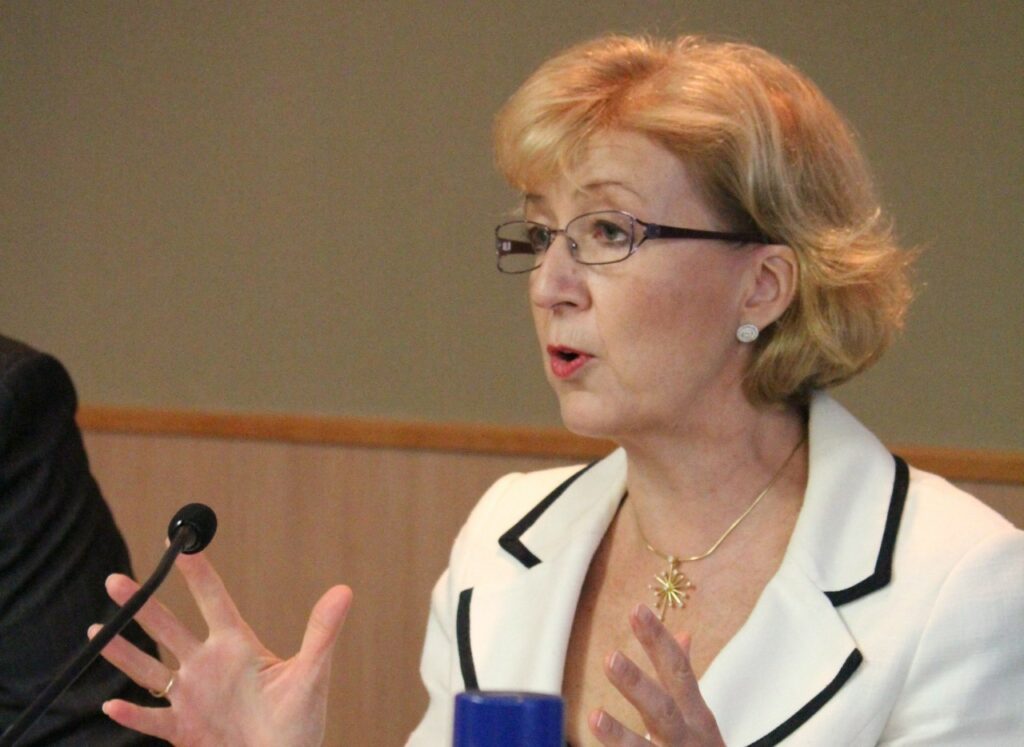The UK’s much-awaited energy White Paper remains a work in progress and is now not expected to be published until Q1 2020, energy secretary Andrea Leadsom revealed yesterday.
However the Business. Energy and Industrial Strategy select committee chair Rachel Reeves said she remained doubtful that the department would even meet that deadline, pointing to continual delays in the white paper’s publication and re-stressing the urgency behind legislating for the country’s net zero target.
Leadsom spoke to the BEIS Committee yesterday (15 October), highlighting that the department’s “number one priority” is meeting the UK’s net zero goal.
The department is currently putting together the long overdue White Paper on the country’s path to achieving net zero emissions by 2050. Leadsom said that they were currently considering a number of different approaches, including deciding on renewables and nuclear levels in the mix, and will publish the paper in Q1 next year.
Two recent consultations have just finished, the results of which Leadsom said were important to consider before they could produce the White Paper. These focused on nuclear and carbon capture, usage and storage (CCUS), two areas that drew particular interest from the committee.
Leadsom also highlighted that the government had recently invested £220 million in nuclear fusion in an effort to cement the UK’s role as a world leader in the technology. But this is unlikely to be included in the White Paper as researchers from the UK Atomic Energy Association still viewed it as being 2040 before the technology could be deployed at scale.
It would be “fantastic if we could include nuclear fusion but I think it would possibly be too optimistic at this stage,” said Leadsom.
She did say that CCUS would form a key part of the UK’s decarbonisation strategy going forwards, although deployment at scale is unlikely till into the 2020s. Recently, £14 million of new innovation funding was provided to CCUS projects in Teeside, Humber, Merseyside and St Fergus however. The latter is expected to be up and running in the next three years according to the Scottish CCUS Association, and could store up to 5.3GT of carbon.
However, uncertainty surrounded a number of aspects of achieving the net zero goal. Not least was the Committee on Climate Change’s suggestion that policy need to be implemented this year to ensure a framework for achieving the UK’s ambitious decarbonisation goal is set.
The Clean Growth Strategy is the first step of this, the secretary of state, but she added that further details will be provided before Glasgow plays host to COP26 next year.
Hand in hand with this was uncertainty about funding, as only £30 million was set aside for decarbonisation in the Spending Review. Leadsom stated this was specifically for resources, and that project funding was not included in that figure.
Since the net zero pledge was made, she said, £2 billion has been pledged to decarbonisation projects, as well as £400 million to be spent on electric vehicle infrastructure, climate finance being doubled from £5.8 million to £11.8 billion and the Contracts for Difference scheme funding 12 new renewables projects that will power seven million homes.
Concerns were further raised about BEIS’s plan to improve domestic energy efficiency, as 1.2 million homes need to be renovated to Energy Performance Certificate Band C annually to meet targets. However currently only 170,000 are being renovated by the designated Energy Company Obligation a year.
Similarly, this improvement is expected to cost £65 billion, and yet public investment in residential energy has halved since 2012. How these gaps in both delivery and investment will be closed will be explained in the White Paper said Leadsom.
Other clarifications expected in the White Paper include whether or not tidal power, including tidal lagoons, will be included in the energy strategy going forwards. This is an “open question” said Leadsom, and something they will take into account despite the failure recent of the Swansea Tidal Bay Lagoon.
One aspect that the fabled White Paper seems unlikely to provide much information on, and which the committee has requested, is smart meters. The rollout target has now been changed to 2024, but no milestones have been released and a proper schedule is required if they are to meet the predicted net saving of £6 billion, or £250 per household, recent cost analysis suggested.
Finally, how Brexit will effect the energy sector and decarbonisation more specifically was discussed. When asked if she had any concerns about meeting energy demand if we crash out of the EU, Leadsom said; “I have none.”
She expanded, praising the UK’s offshore wind sector and our positive relationships with other nations with regards to energy trading, and highlighted that we only import 5% of our natural gas from the EU.
Of more concern to the committee, was the lack of reassurance that environmental standards won’t slip below EU levels during trade deals post Brexit – an assurance that featured in Theresa May’s Brexit deal but has not been mentioned in the most recent iteration. Leadsom could only say that they intended to keep environmental standards high.






